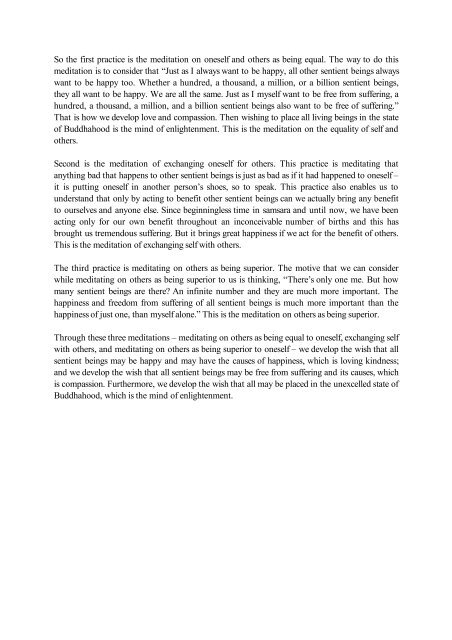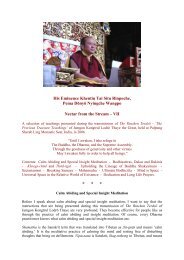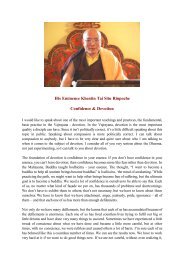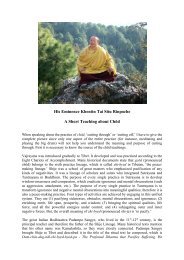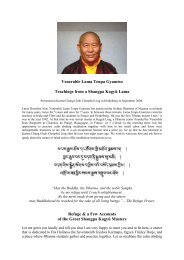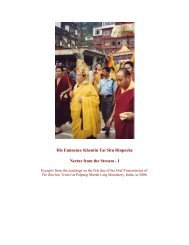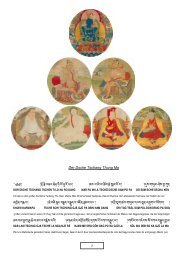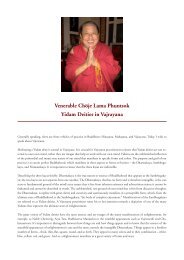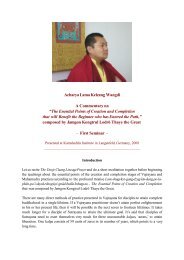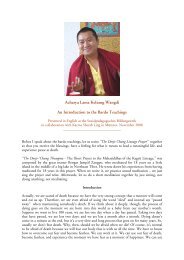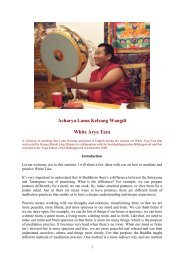Page 1 Venerable Khenchen Thrangu Rinpoche The Union of Sutra ...
Page 1 Venerable Khenchen Thrangu Rinpoche The Union of Sutra ...
Page 1 Venerable Khenchen Thrangu Rinpoche The Union of Sutra ...
You also want an ePaper? Increase the reach of your titles
YUMPU automatically turns print PDFs into web optimized ePapers that Google loves.
So the first practice is the meditation on oneself and others as being equal. <strong>The</strong> way to do this<br />
meditation is to consider that “Just as I always want to be happy, all other sentient beings always<br />
want to be happy too. Whether a hundred, a thousand, a million, or a billion sentient beings,<br />
they all want to be happy. We are all the same. Just as I myself want to be free from suffering, a<br />
hundred, a thousand, a million, and a billion sentient beings also want to be free <strong>of</strong> suffering.”<br />
That is how we develop love and compassion. <strong>The</strong>n wishing to place all living beings in the state<br />
<strong>of</strong> Buddhahood is the mind <strong>of</strong> enlightenment. This is the meditation on the equality <strong>of</strong> self and<br />
others.<br />
Second is the meditation <strong>of</strong> exchanging oneself for others. This practice is meditating that<br />
anything bad that happens to other sentient beings is just as bad as if it had happened to oneself –<br />
it is putting oneself in another person’s shoes, so to speak. This practice also enables us to<br />
understand that only by acting to benefit other sentient beings can we actually bring any benefit<br />
to ourselves and anyone else. Since beginningless time in samsara and until now, we have been<br />
acting only for our own benefit throughout an inconceivable number <strong>of</strong> births and this has<br />
brought us tremendous suffering. But it brings great happiness if we act for the benefit <strong>of</strong> others.<br />
This is the meditation <strong>of</strong> exchanging self with others.<br />
<strong>The</strong> third practice is meditating on others as being superior. <strong>The</strong> motive that we can consider<br />
while meditating on others as being superior to us is thinking, “<strong>The</strong>re’s only one me. But how<br />
many sentient beings are there? An infinite number and they are much more important. <strong>The</strong><br />
happiness and freedom from suffering <strong>of</strong> all sentient beings is much more important than the<br />
happiness <strong>of</strong> just one, than myself alone.” This is the meditation on others as being superior.<br />
Through these three meditations – meditating on others as being equal to oneself, exchanging self<br />
with others, and meditating on others as being superior to oneself – we develop the wish that all<br />
sentient beings may be happy and may have the causes <strong>of</strong> happiness, which is loving kindness;<br />
and we develop the wish that all sentient beings may be free from suffering and its causes, which<br />
is compassion. Furthermore, we develop the wish that all may be placed in the unexcelled state <strong>of</strong><br />
Buddhahood, which is the mind <strong>of</strong> enlightenment.


